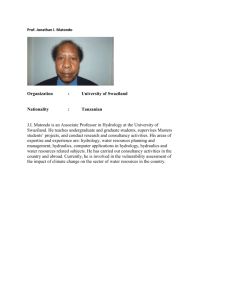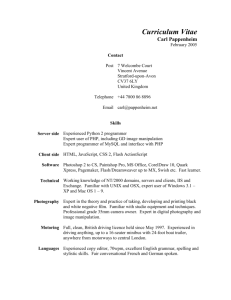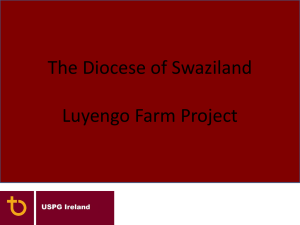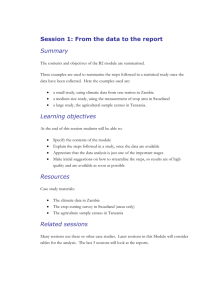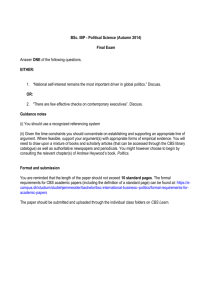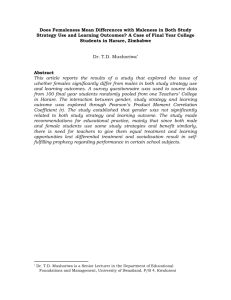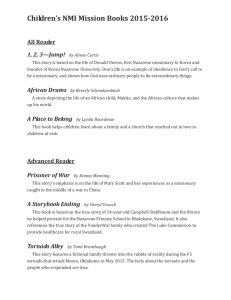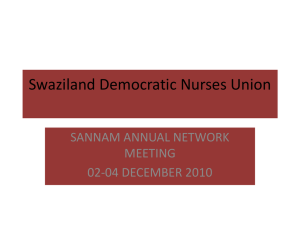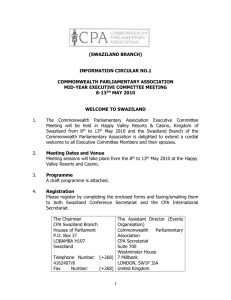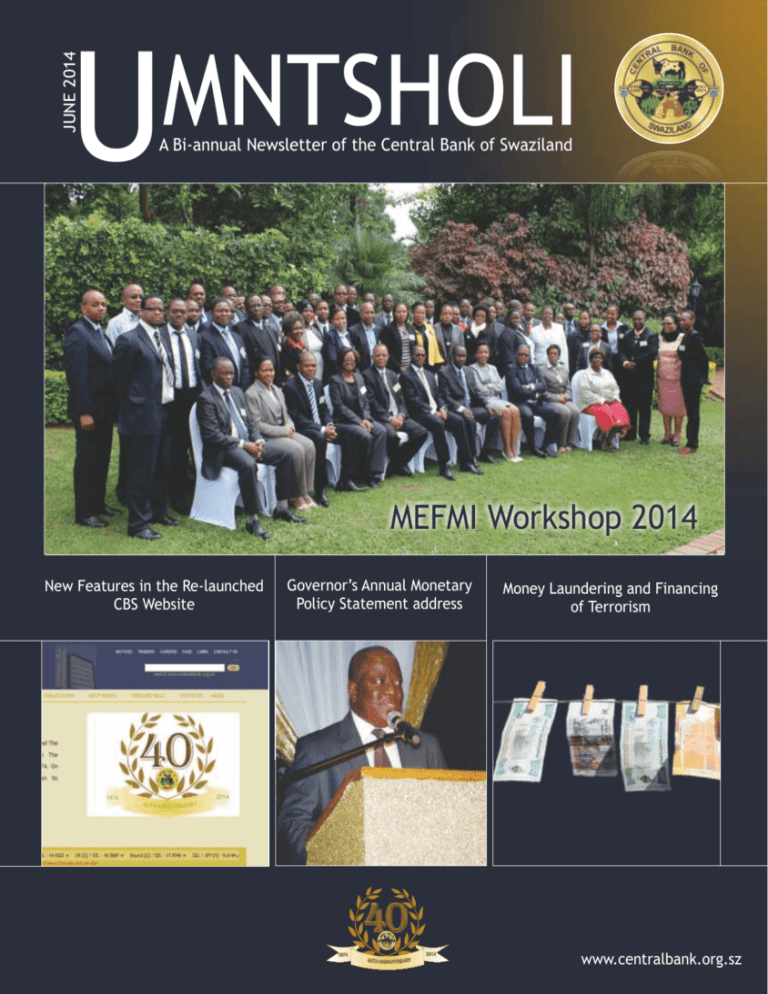
JUNE 2014
MNTSHOLI
U
A Bi-annual Newsletter of the Central Bank of Swaziland
MEFMI Workshop 2014
New Features in the Re-launched
CBS Website
Governor’s Annual Monetary
Policy Statement address
Money Laundering and Financing
of Terrorism
40
EMNTSHOLI
SW
AZILAND
1974
1974
40TH ANNIVERSARY
2014
2014
www.centralbank.org.sz
MONEY LAUNDERING
YOUR ROLE IN THE FIGHT AGAINST
How illegal money integrates into a financial system
The money laundering process
Collection of illegally
obtained money
Funds are integrated through the
purchase of luxury goods/assets
Illegal money integrates into
financial system
Funds are “layered” through
a series of wire transfers
between on/off shore banks
YOUR ROLE is to desist from underground dealings, buying or
selling foreign currency in the black market, accepting bribes
from people, doing any shady businesses, drug trafficking and smuggling,
theft, fraud, tax invasion and human tracking
For more information visit www.centralbank.org.sz
or call (+268) 2408 2000
Money laundering process sourced from www.superyachtnes.com
Governor’s Foreword
The Central Bank's
responsibility is the
promotion of a sound,
efficient and stable
financial system and the
revitalisation of our ailing
Governor, Majozi V. Sithole
economy towards the path
of sustainable growth and development. This mandate has
been the cornerstone of this year's Annual Monetary Policy
Statement, whose theme is “Strengthening the financial
sector through enhanced financial stability to promote
economic growth.”
A stable financial system is crucial for the country in order
to facilitate and enhance economic processes, hence this
theme. The Central Bank intends to achieve this theme by
focusing on certain priority areas as its pillar for sustaining
and enhancing financial stability conducive to economic
growth and development. These priority areas are; the
continuation of a sound monetary policy to ensure price
stability in the economy; the sustenance of prudential
surveillance and supervision over banks to strengthen the
resilience of the banking system; and developing a financial
sector strategy. Through the IMF technical assistance, the
Bank will assess the current status of the country's financial
system and identify and address key challenges to enable
Umntsholi is an in-house publication
of the Central Bank of Swaziland.
It is published twice a year by the Corporate
Communications Division in the Office of the
Governor.
© CBS 2014. All rights reserved.
Disclaimer: Opinions and views expressed in
this publication are not necessarily the views
of the Central Bank of Swaziland.
Editor
Lindokuhle Nxumalo
Deputy Editor
Lwazi Dlamini (UNISWA Intern)
Editorial Assistant
Zanele Mkhonta
Design and Layout
Lwazi Dlamini (UNISWA Intern)
Contributors
Refiloe Mamogobo
Bheki Khoza
Bheki Khumalo
Zandile Ndlela
Collin Malaza
Sandile Mango
Ruth Shongwe
the financial sector to contribute more meaningfully to
the overall performance of the country's economy. In
order to attain inclusive growth, we need a financial
system that advocates and promotes financial inclusion.
I am happy to share with you, the positive results from
the Strategic Planning Retreat in April, where we met as
management to revisit our Values as a Bank and to clarify
the direction that the Bank is going to take this year. I
can safely say that the prospects are looking good, and
we have all started on a high this financial year.
This year, the Bank celebrates 40 years of existence, a
great milestone in the economic development of the
country and the Bank's quest to position itself for
excellence in Swaziland and the Eastern and Southern
African Region.
I would like to encourage staff members to keep up the
good work and commitment to the Bank that has been
evident in the past financial years. While one is
continuously optimistic, I must state that we need a
change in our mindset at the Bank in order to play a
significant and due role in attaining the nation's 2022
Vision. Our work culture has to change and we have to
live and practice the Values of the Bank. Respecting the
job and stakeholders is paramount for delivery of the
Vision. Change is needed.
FROM THE EDITOR
Welcome to our mid-year edition of
Umntsholi, the official in-house newsletter of
the Central Bank of Swaziland.
This edition sees a comprehensive list of
topics and events that have taken place in the
Bank since April this year. We have made an
effort to capture these events, even though
we cannot feature all of them in this edition.
This edition covers the CBS Annual
Management Strategic Retreat 2014/ 2015
where the Governor, for the first time, set the
tone and shared with management on how he
is going to lead the Bank. We also brief you on the Governor's First Annual
Monetary Policy Statement Address to stakeholders, which was held in
April this year.
We continue to improve the Bank's infrastructure for internal and
external communication, and in this regard, the Bank re - launched its
website in June. The website comes with an improved look and features
that contribute to the Bank's vision. We would like to take this
opportunity to thank departments who worked tirelessly with the
Corporate Communications Division in making this project a success. Log
onto www.centralbank.org.sz to experience our new, user friendly site.
We would like to welcome our UNISWA interns, who joined us on 01 June
2014. We hope that you are learning a lot from the Central Bank family
and that you enjoy your stay with us.
Enjoy your reading and please do not tire to give us feedback.
3
Vision
To become a proficient Central Bank in Eastern
and Southern African Region by 2022
Mission
To foster financial sector stability conducive to
economic development in Swaziland
Values
Integrity
Trust
Accountability
Respect
Excellence
Transparency
“
Some advanced economies
have returned to growth,
while others continue to lag.
”
- Governor, Majozi V. Sithole
Headline inflation averaged 5.6 percent in 2013
compared to an average of 8.9 percent in 2012.
Governor of the Central Bank of Swaziland, Mr.
Majozi V. Sithole delivered his first Annual Monetary
Policy Statement Address to stakeholders of the Bank
at the Royal Swazi Sun Convention Centre in April 4,
2014.
The Governor also clarified on the Central Bank of
Swaziland in consultation with the Monetary Policy
Consultative Committee's (MPCC) decision to
maintain the discount rate at 5 percent throughout
2013, explaining that the underlying rationale to
maintain the rate was that despite the favourable
turn around in inflation, albeit seen to be
temporary, coupled with the signs of recovery
gradually emerging on credit extension to the
private sector especially towards the end of 2013,
the expected impetus to economic growth was not
fully achieved.
During the statement address, the Governor gave an
outlook of the global economy which remains
unsteady – saying that some advanced economies
have returned to growth, while others continue to
lag.
He also observed that the global economy continued
to register solid output growth during December
2013, mentioning that the world economy grew on an
annual basis by 2.4 percent in 2012, according to the
UN World Economic Situation and prospects for
2013/2014.
The event was attended by leaders from the
financial sector, private sector, tertiary institutions
and the public sector.
In terms of recent economic developments in
Swaziland and the Gross Domestic Product (GDP), the
Governor stated that preliminary estimates reflect
that the real economy expanded by 2.8 percent in
2013 compared to a revised estimate of 1.9 percent
in 2012. This notable increase in 2013, he said,
benefited from improvements in the secondary and
tertiary sectors.
For the full Annual Monetary Policy Statement
2014, download at www.centralbank.org.sz
or contact the Corporate Communications
Division at info@centralbank.org.sz or call
(+268) 2408 2147 / 2408 2160.
On Price Developments, the Governor quantified
that consumer inflationary pressures were subdued
in 2013 mainly benefiting from lower food and
transport prices as well as slower increases in
administered prices (such as fuel and electricity).
5
NEWS
Governor's First Annual Monetary Policy Statement
Address to Stakeholders
NEWS
Focus on Post Budget Seminar
CSC Chairperson & Acting CBS
Deputy Governor, Masotja Vilakati
with FSE & CC CEO, Bonisiwe Ntando
Corporate Skills Centre’s Cynthia
Mabaso
The Governor of the Central Bank of Swaziland
projected that Real GDP growth is to remain at
around 2% in the coming years. This he said during
the Post Budget Seminar held at Royal Swazi Sun
convention center in March, 2014 hosted by the
Corporate Skills Centre (CSC) in partnership with the
Federation of Swaziland Employers and Chamber of
Commerce (FSE-CC).
His words echo those of Martin Dlamini, Honourable
Minister of Finance who noted that domestic revenue
shows increase of 9% in nominal terms. Pleased with
such growth which has surpassed external revenue,
the minister spotted this as a sign that the country is
moving away from dependency on SACU receipts.
The minister also brought it to light that he expects
the next two years to follow suit.
The objective of the seminar was to provide a forum
for professionals from the private, public sector and
civic society to share views on the 2014/2015
national budget. It was also meant for professionals
to assist the Ministry of Finance and the whole
government to effectively execute the budget.
In his address during the seminar, the governor
unveiled the purpose and focus of the budget which
is to “invigorate economic growth, create
employment opportunities and accelerate public
reforms” aimed at maintaining macroeconomic
stability; maintaining peace and security; improving
the welfare of the people of Swaziland with long
term perspective of transforming Swaziland in to a
developed country as per His Majesty's 2022 vision.
The Governor underlined the seminar's role in giving
the ministry direction and strength to navigate
through the unprecedented fiscal crisis that
confronted Swaziland, owing to the global financial
crisis.
He cited the contributions of such forums as
backdrop of the ministry's previous survival of the
crisis.
The Governor also commended the improvement in
revenue collection by the Swaziland Revenue
Authority (SRA), which as a result, will cushion
government from financing its budget out of the
available reserves from the Bank.
“Government's priorities stand to see
economic growth, job creation and
acceleration of public reforms. Real
economic growth is expected to have
increased from 1.7 percent in 2012 to 2.8
percent in 2013. Under current forecasts, we
expect growth to remain around 2.0% or
above in the medium term.”
- Martin G. Dlamini, Minister of Finance
“The aspiration of Swaziland to attain first
world status is an enormous challenge and
e v e r y o n e ; b a n k s , p r i v a t e s e c t o r,
government, NGOs, churches and citizens
and the like have to play a part for this dream
to be realized.”
- Phil Mnisi, Banker’s Association
“A sizable number of businesses especially
SMMEs, depend on government as a
purchaser of goods and services. The manner
in which the national budget is allocated has
a direct impact on a lot of businesses in
Swaziland.” - Fikile Nkosi, FSE & CC
6
CBS Management during the strategic retreat
correlation with the success of the Bank. The
Governor explained that Trust is critical, saying
that deadlines should be met by every member
of staff and that information sharing is key in
building trust and decision making.
The Central Bank of Swaziland Governor, General
Managers, Heads of Departments, and Divisional
Managers attended the CBS Annual Strategic
Retreat held at Orion Hotel in Piggs Peak from 26
to 27 May 2014. This session was a continuation of
a previous one in March, which focused on the
progress of the CBS Strategy in respect of SWOT,
PESTLE and the execution of the corporate and
departmental strategy.
The Governor also placed emphasis to
management on the significance of respect,
saying that it is very critical that time, jobs, and
colleagues are respected and that selfmonitoring and integrity should form base of any
actions undertaken while working for the Bank.
He also pleaded with management to improve
the weakest link within the Bank in order to
improve the Bank's strength.
Discussions during this year's retreat were based
on the theme “Values – the Underlying
Transformational Factor in the CBS Agenda”. This
being the Governor's first Strategic Retreat with
the Central Bank of Swaziland, he shared with
management the approach he will use to lead the
Bank during his tenure in office.
The Governor also declared zero tolerance on
corruption, theft and putting the Bank into
disrepute, saying that these water down the
efforts of the Bank. He also insisted on the need
to have clear policies to guide decision-making
and delivery of CBS work.
The Governor advised management to be clear of
the mandate of the CBS, and to ensure that
stakeholders and shareholders agree with the
mandate, targets and how these can be achieved
efficiently and effectively.
He emphasised on the importance of living by the
Bank's Values, first as individuals and collectively
as a Bank. He advised that Values should be
pursued at all times, because this has a positive
He went on to explain the importance of working
out department strategic plans in order to be
aware of risks, setup mitigation plans and be
ready to assess in dealing with these.
7
NEWS
The CBS Annual Management Strategic Retreat
NEWS
Modeling and Forecasting Training
The facilitator was Jean Havugimana, MEFMI
Programme Officer and the Resource persons
were Professor Malikane from Wits University
(South Africa) and Executive Assistant to the
CBS Economists, Mr Samuel Dlamini, Bongani
Dlamini,Vusi Khumalo and Assistant Economist,
Zana Mabuza attended the MEFMI in-country
training workshop on Economic Modelling and
forecasting which was held in April 2014 at
Mountain Inn Hotel.
The training was designed to allow participants
to explore various econometric methods useful
for policy design, analysis and management. Its
main objective was to equip participants with
modelling, forecasting and policy analysis
techniques.
Executive Assistant to the Governor, awards CBS’
Zana Mabuza a Certificate of Participation
It also provided participants with the practical
illustration of the above techniques using their
local data and gave them a clear understanding
of the salient features, challenges and
opportunities of Swaziland economy.
Swaziland Revenue Authority, Swaziland
Investment Promotion, Swaziland Sugar
Association, Swaziland Economic Policy, Analysis
Research Centre, Ministry of Finance, Ministry
Economic Planning and Development were also
represented in the training.
Executive Assistant to the Governor, awards Swaziland Revenue
Authority’s Phindile Masuku a Certificate of Participation
8
As part of its responsibility of coordinating the
Corporate Social Investment (CSI) Programme, the
Central Bank of Swaziland sponsored the Global
Business Roundtable (GBR) 3rd Annual Youth Summit
hosted by Swaziland in June 14, 2014 at Royal Swazi
Sun Convention Centre.
The sponsorship was geared at fulfilling the CSI
scope of developing sound leadership skills in young
people, who are still going through formal
education from high school, tertiary level and high
professional and academic levels. The summit was
cemented on the promotion of tomorrow's leaders
today and brought together renowned speakers and
business thinkers to impart to the next generation
of business leaders.
Building on the summit’s theme, “Establish,
Promote and Execute Ethical Leadership in
Tomorrow's Leaders,” GM Corporate Services,
Cynthia Lukumba, shed light on the importance of
positive personal identity. She elucidated that
“who” each Future Leader is (identity), matters
more that “what” they are (position). The
GM Corporate Services, Cynthia Lukumba, with Honorable Minister of
Commerce, Industry and Trade, Gideon Dlamini at the Youth Summit
Honorable Prime Minister, Sibusiso Dlamini, who
was represented by his Deputy, Paul Dlamini,
stated that any economy that failed to embrace
the energy of the youth was missing a vital
resource.
The GBR Future Leaders hosts a Youth Summit
Annually for career and business professionals
whose main mandate is to share skills and
opportunities while building capacity and
facilitating holistic development of its members
to better position them for effective
contribution; particularly to the market place.
Money Laundering Training for Banks
The Financial Regulation, Exchange Control
Division, hosted Anti Money Laundering (AML)
Workshops in February 2014, to capacitate
banking institutions on the contents of the Money
Laundering/Terrorist Financing (Prevention) Act,
2011 in order to enable institution compliance
with the obligations of the Act.
The training workshops covered the Definition
of ML, the predicate offences of ML, risks to
institutions associated with ML,
reasons
behind criminals laundering money, the stages
of ML, the effects of ML, a risk based approach
to AML, and the obligations of accountable
institutions and the role of Financial
Intelligence Unit (FIU).
As a regulatory body, the Central Bank's role is to
assist institutions and bring them up to speed with The Division also trained management and staff
the obligations of the Act in order for institutions of the Swaziland Building Society and Central
to put in place effective AML sanction compliance Bank members of staff.
systems and controls.
There are severe penalties for institutions failing
to comply with the obligations of the Act.
9
NEWS
Central Bank Supports GBR 3rd Youth Summit
NEWS
IMF Gives Swaziland A Clean Bill of Health
“
Swaziland's economic growth has recovered
since 2011 when it experienced a fiscal crisis following a
significant reduction in revenues from SACU.
”
- Jiro Honda
Swaziland's key economic policy challenges are to
strengthen its resilience to exogenous shocks and
achieve high, inclusive growth, while meeting
critical social and development needs.
In light of these challenges and the need to
safeguard the exchange rate peg, Honda noted
that the mission encourages the authorities to
maintain prudent fiscal policy (with a fiscal deficit
less than 2 percent of GDP) over the medium-term,
while protecting spending for critical social and
development needs.
Such a prudent fiscal policy stance would help build
a sufficient international reserve buffer (five to
seven months of imports) and maintain modest
debt distress, and provide Swaziland with better
protection for possible shocks. To help implement
the prudent fiscal policy, the mission also
encourages the authorities to enhance efforts for
public sector reforms and public financial
management reforms, while welcoming further
efforts to enhance tax administration.
A mission of the International Monetary Fund (IMF)
led by Jiro Honda visited the Kingdom of Swaziland
during April 28 to May 12, 2014 to conduct the 2014
Article IV consultation with Swaziland. The mission
met with the Prime Minister, Hon. Sibusiso Dlamini;
Minister of Finance, Hon. Martin Dlamini; the
Governor of the Central Bank of Swaziland, Majozi
Sithole; other senior government officials, as well
representatives of the private sector and
development partners.
At the end of the mission, Honda elucidated that
Swaziland's economic growth has recovered since
2011 when it experienced a fiscal crisis following a
significant reduction in revenues from the Southern
African Customs Union (SACU). He further revealed
that in 2013, economic activity is estimated to have
grown by 2¾ percent.
The recent surge in the SACU revenue helped to
improve international reserve coverage to about four
months of imports by March 2014. With a return of
confidence in the economic outlook, commercial
bank credit to the private sector has been growing,
while the recent government bond auctions were
oversubscribed. Inflation remained modest at 5.1
percent in March 2014.
Honda pointed out that Swaziland's challenges,
however, remain significant. The recent fiscal crisis
points the need to strengthen Swaziland's resilience
to shocks, while the economy has suffered from weak
growth performance, which adversely affects social
developments. Furthermore, there are risks to
Swaziland's economic prospects, in particular the
uncertain global and regional economic outlook that
could lower SACU revenues.
"The mission echoes the authorities' concerns
about weak growth performance. This weak
performance has been largely associated with low
private sector development (depressed private
investment in particular). In this light, the mission
encourages the authorities to proceed with wideranging structural reforms, including further
improving business climate, facilitating financial
intermediation, and pursuing land management
reforms.
To this end, the mission commended that the
Central Bank of Swaziland's plan to formulate a
Financial Sector Strategy, with technical assistance
from the IMF and the World Bank."
10
CBS Hosts MEFMI For COMESA Framework On Financial Stability Assessment
And Reporting Requirements Implementation And Awareness
The Central Bank of Swaziland recently established
the Financial Stability Unit to concentrate on
macroprudential surveillance. Since financial
stability assessment and macroprudential
surveillance are new concepts, the Central Bank of
Swaziland (CBS) hosted a technical assistance
mission from the Macroeconomic and Financial
Management Institute of Eastern and Southern
Africa (MEFMI) to provide guidance on the
implementation of the COMESA Framework for
Financial Stability Assessment and reporting
requirements from 7 to 11 April, 2014.
CBS General Manager, Masotja B. Vilakati addressing delegates
The mission also conducted a one-day national
workshop to provide awareness and guidance to
relevant stakeholders on the COMESA Framework
for Financial Stability Assessment, Macro Stress
Testing, and Financial Stability Reporting.
The workshop was held at the Royal Swazi Spa,
Libandla Conference Room in April 10, 2014 and was
attended by officials from line functions of the
Central Bank of Swaziland which have linkages to
the Financial Stability Unit, representatives from
the Financial Services Regulatory Authority (FSRA)
responsible for the supervision and regulation of
Non-Bank Financial Institutions (NBFIs), and the
Office of the Commissioner of Cooperatives
Development – regulators of Savings and Credit
Cooperatives.
He also indicated that the Governor, in his Policy
Statement issued in April 3, 2014 gave the nation
a clear direction in this area, when he said that
since the financial system is made up of banks
and other financial intermediaries, safeguarding
the stability and maintaining public confidence
in the financial system, it is the primary
responsibility of the Central Bank of Swaziland in
collaboration with the regulators of financial
sub-sectors (namely, regulators of insurance and
retirement funds, the capital markets and the
non-bank financial institutions (NBFIs) to
promote the soundness and efficiency of their
respective financial sub-sectors in order to
ensure the soundness and resilience of individual
institutions.
During the workshop, Acting Deputy Governor, Mr
Masotja Vilakati underscored the point that a stable
financial system is the key element for a strong and
efficient economy. He also mentioned that
participants in the economy need to have
confidence that the financial system is safe, sound,
functions effectively to ensure intermediation and
ultimately be a factor in economic growth.
However, he said, at the financial system level,
the Central Bank of Swaziland has a legal
mandate to promote and safeguard financial
stability as stipulated in various provisions under
the Central Bank of Swaziland Order, 1974 and
the Constitution of the Kingdom of Swaziland.
He stated that the Minister of Finance, Martin G.
Dlamini in his 2013 Budget Speech cemented the
need for continued macroprudential regulation and
supervision of the financial system when he said the
Central Bank of Swaziland will continue to
undertake surveillance of the financial system
through the established Financial Stability Unit.
11
FSRA CEO encouraged information sharing
between the regulators since macro-prudential
surveillance is a new concept which has to be
understood well.
The MEFMI mission team comprised of Sipho
Makamba, Programme Officer responsible for
Financial Institutions Regulation and
Supervision, Dercio Mutimucuio, MEFMI Fellow,
Dr. Charles Abuka and Gift Chirozva.
Meet our UNISWA
The CBS Internship programme enables me to acquire knowledge and develop my abilities
while building my CV. I have been given enough room to apply my theoretical knowledge
to the reality of the corporate world. I get the chance to rotate within the
Operations Department which has more than six divisions. My expectation was receiving a
warm welcome from the CBS family and I got just that. CBS is like a home away from home.
Babazile Mabuza
Operations
Bcom Management
Bcom Accounting & Finance
CBS has afforded me the opportunity to learn more about the different roles in the human
resources field and to equip myself with practical skills. Through the banks’ Human Resources
Department, I have already been involved in short-listing candidates for job openings. Using
Microsoft excel has been a challenge as I am not used to it, but I am working hard to
harvest good experience at the end of the internship. My expectation is to learn more
about the different roles in the HR department.
Mancoba Hlophe
Corporate Services
Simiso Simelane
(Financial Regulation - Bank
Supervision)
More than gaining valuable industry experience and seeing concepts learnt in class being
applied in the real world, the CBS internship programme has opened my eyes to the importance
of regulatory bodies in a financial system. I have been involved in the production of the
Bank’s weekly reports on its compliance with liquidity requirements. I also get to
familiarize myself with numerous regulatory literature and legislation. I came to the bank
expecting the chance to apply myself and make a contribution. My expectation has been well met.
Bsc in Computer Science & Mathematics
Bcom Accounting & Finance
Through the CBS internship programme I got to apply all the theory I learnt at school in a
real work environment. In my department I had the opportunity to manage systems and
provide support for the system users. When I came to CBS, I had expected to
grow professionally particularly in Computer Science. My expectations have
been met. I have learnt a lot in the few weeks I have been here.
Menzi Khumalo
(Operations)
A benefit brought by the Central Bank of Swaziland internship programme is seeing
and learning how the computer science concepts we learn at university
apply in the real world. I get to learn new systems in the real world that we do not
have the opportunity to learn about at school. In brief, I am getting the feel of the real
world environment.
Thabiso Dlamini
(Operations)
Bcom Accounting & Finance
Bsc in Computer Science & Mathematics
The CBS internship programme has brought several benefits to me. This include, among
other things, gaining work experience and understanding of how the corporate world
functions. I am able to apply the theoretical knowledge I acquired in class. I feel privileged
to be considered part of the staff and doing work with the rest of the Internal Audit
team. I had expected to be given work assignments, a warm welcome and mentorship as
well as gaining work experience. My expectations have been met.
12
Precious Kunene
(Internal Audit)
Interns for 2014
The CBS internship programme has allowed me the chance to cultivate my experience in brand
development, public relations, corporate writing, media relations, crisis communication and
corporate communication skills. My key role is assisting the division complete projects
specified in its first quarter workplan. Meeting daily deadlines is my weekly challenge.
My expectation was being given the opportunity to see the product of my theoretical knowledge
applied in a corporate environment. My expectation has been met - this newsletter is evidence.
Lwazi Dlamini
Corporate Communications
BA Journalism and Mass
Communication - Public Relations and Advertising
BA Social Science - Economics
and Statistics
It has been a great opportunity to learn, develop myself and my skills with the CBS in
preparation for life after graduation. Unlike other institutions which require use of one major,
the CBS internship allows me to enhance my skills in both fields of study-economics and
statistics. As a research assistant, my role is assisting in organizing, analyzing and presenting
(i.e. creating reports on) collected data. My expectations are being met with each day that
passes, as I am assigned more work to do and strive to do the work as best as I possibly can.
Sephutile Mhlongo
(Economic Policy Research
and Statistics)
What I am gaining from the CBS internship programme is the great, relevant experience in
Finance and Financial Markets. In my division, I am dealing with investments. Although
I am still familiarizing myself with functions of the department, I am confident that I will
master them as the internship continues. I can already see my general expectations being
met. I am working in a friendly environment.
Sanele Dlamini
Finance and Financial Markets
BA Social Science - Economics
and Statistics
Bcom Accounting & Finance
The CBS internship programme has offered me work experience in the corporate world as
well as a peek into the accounting and banking profession. In my department, I get to
partake in the morning and afternoon clearing sessions. One of my major challenges in the
Operations department is the identification of errors in the reports.
Phesheya Sibisi
Operations
Bcom Accounting and
Finance
Innocentia Ndzima
A benefit the internship program brought to me is understanding the functions of the bank
and being able to bridge the gap between theory and what is really happening in the
corporate world. I have been attached with the Finance and Financial Markets department
where I am working as a domestic debt officer. My role is to attend Swaziland Government
Treasury Bills clients and help them with their applications, among other things. My
expectations were to improve my practical skills and they were met.
Finance and Financial Markets
13
Respective
Your Role in the fight against Money Laundering
Collection of illegally
obtained money
illegal money integrates into
financial system
Bhekie Khumalo
Money Laundering Reporting Officer
Funds are integrated through the
purchase of luxury goods/assets
Funds are “layered” through
a series of wire transfers
between on/off shore banks
In the past we have been talking about money
laundering, its definition and how people commit
this kind of crime. The issue that has not been
exhausted is the role of employees in financial
institutions and ordinary citizens in combating
money laundering.
The first role of citizens is not to be found
practicing underground dealings, buying or selling
foreign exchange in the black market, accepting
bribes from people, stealing or doing any other
shady businesses. These are crimes, and are
punishable by law.
Employees are also expected to be vigilant in their
work, especially because they deal with the public.
Employees are supposed to be their brother's
keeper and not be blinded by possible benefits or
fear of victimization when they see one of them
falling into any of these crimes. This kind of
behavior can be reported to your Ethics Officer (if
available in your institution) or the Financial
Intelligence Unit (FIU). (See FIU contact details
below).
Management can also play a role in this, first by
leading by example and secondly by conducting
Employee Due Diligence (EDD). Employee Due
Diligence means all employees conduct and
dealings are closely monitored. A question may
arise on how management can monitor employee
behavior. The answer is simple - Be vigilant;
monitor the kind of company they keep, their social
14
life their behavior, that their financial
commitments are not excessive such that from
month to month, they try to make ends meet.
This can be a two way practice; employees have
a role to monitor management and if they see
some of the above issues, they can report to
Ethics Officer or the (FIU).
The role of citizens is to report anyone, who
without known sources of income is flourishing.
That person may be dealing in white collar or any
other crime. This can be reported to the police
or anonymously to the FIU, which will attend to
the report. A word of caution though is never to
try to play detective or try to investigate. If you
are suspicious, report to the right authorities.
The objective of this article is not to promote
gossip but curb criminal activities that have been
happening in front of our eyes for too long
without anyone taking action. Like the late King
Sobhuza II said “nawe uliphoyisa.”
You may ask yourself what these crimes have to
do with Money Laundering or Terrorist Financing
(ML/TF), the answer is simple; these crimes are
predicate crimes of both ML and TF.
To report any suspicious transactions or
activities, contact the Financial Intelligence
Unit at; The Central Bank of Swaziland, Imfumbe
Building Tel: 2408 2000.
Take Care Of The Pennies And The Pounds Will Take Care Of Themselves
Respective
Financial
Issues
Learning
and
Growth
Issues
1. Vision
2. Mission
3. Corporate Strategic
Objectives
4. Departmental Strategic
Objectives
5. Divisional Operational
Objectives
6. Individual Performance
Objectives
Internal
Business
Processes
Issues
Zandile Ndlela
Operational Risk Specialist
Customer
Issues
The tendency to concentrate on more significant
issues and projects at the expense of smaller,
immaterial activities has been the major
contributor to most organizations' failure. In the
Barrings Bank case, the executive neglected their
oversight function and got overwhelmed by the
“profits” made by the Rogue Trader, Nick Lesson.
Controls were overlooked whilst management
admired and rewarded the “whiz kid's”outstanding
performance.
Often times the executives' weakness is looking at
the bigger picture and thriving to get there and in
the process trample on the key elements that will
ensure resilience and sustainability. Formal and
structured risk management for instance, is one
such element that managers (should be risk
managers) regard as a waste of time and if it is done,
it is merely to tick a box than integrating it to the
day-to-day business processes and decision making.
Remember, the man who moves a mountain
begins by carrying away small stones! The
“trivial” people issues can make or break the
organization. This can penetrate through all the
other building blocks of the corporate strategy
implying that the interdependencies of the four
perspectives of a balanced score card as
portrayed in the diagram above, should never be
overlooked.
On that note, no single perspective should be
considered in isolation. Whilst systems' access
controls could seem to retard efficiency in
operations, they save millions in terms of both
direct and indirect financial costs.
Similarly, a manager's lack of communication
skills with his/her subordinates could frustrate
the operational processes, leading to customer
complaints (negative reputational impact),
translating to significant financial losses.
Some organizations have lost millions in cash,
reputation severely damaged and had to part ways
with key staff members with vast knowledge due to
petty mistakes of overriding controls in order to be
seen to be efficient, perpetuated by either
ignorance or malicious intent of course. Whilst
being penny-wise and pound foolish is not advisable,
it should be appreciated that a journey of a
thousand miles begins with a single step.
The Bank's vision may not be achieved if “small”
issues like internal controls, performance,
communication and petty cash are not well
managed.
In an endeavor to ensure that all such risks are
managed, the CBS ERM Framework caters for
individual risk framework outlining how
Reputational, Compliance, People, IT,
Operational, Fraud, Strategic, Environmental,
Financial and other risks are to be managed and
monitored effectively without overlooking even
the most insignificant aspect. Every risk maker
being a risk taker requires full participation and
involvement at all levels without undermining
the process on the basis that it is a waste of time;
embrace it and see the returns.
15
Respective
Central Bank Security and Professionalism
Bheki Michael Khoza
Security Supervisor, Cash Centre Branch
Today's work requires a person with an
exceptional degree of skill, training, and
information. The person who demonstrates these
qualities is recognised by others as a professional.
Professionals exude the confidence and skill to
enable the rest of the Central Bank employees to
have faith in their ability to act in the public's
interest. The security officer who meets these
standards is a professional in the fullest meaning
of the word and respected as such.
Education
By virtue of having completed certain education
programs and having passed official exams,
professional security officials are recognised as
possessing distinctive kinds and degrees of
knowledge and skills. There are types of
knowledge and skills in which the average citizen
feels different and therefore turns to consult with
the personally trained officers for help in the form
of advice and other services.
The Standards of Performance
Professional people are expected to be dedicated
high ideals. They are assumed to operate in
superior code of ethics and high dimensions of
personal character. To this end, professional
organizations, like the Central Bank, should
establish standards of ethical performance,
standards of competence and personal behaviour
that sets an example by mere personal
presentation for the whole organization to be
proud of. Professional people take pride in these
standards and expect members of their
profession to meet them.
The continuous flow of social and economic
changes in the global village, internationally
recognised training and the improvement of
standards is a continuing challenge for every
security authority.
The logic behind the fundamental principles
distinguishes the competent professional person
from the mere technician. This is as true security
work as it is in accountants, lawyers, teachers,
economists and other professionals.
A security supervisor is personally judged by the
general public to represent the corporate image
of his or her employer.
The client as well, looks on her or him as the first
contact of the corporation and measures the
company by the presentation of security dress
code amongst other things especially personal
behaviour towards customers.
Exemplary:
For those who have just joined
the security cadre and those like us, already in
long service, let's set an example. Let's maintain
a professional code of ethics like the rest of
departments in the Bank. Professionalism is vital
to any position of authority, and this is no less
true for the security supervisor.
16
New Features In the Re-launched CBS Website
CBS Governor, Senior Management and departmental focal persons during the launch
The Central Bank of Swaziland Governor, Majozi
Sithole, officially re-launched the Central Bank of
Swaziland website in June 2014.
The Governor noted that the re-launch of the new
improved and appealing website depicts that the
bank is also working towards achieving Vision 2022.
Ndzinisa applauded the support provided by
management, departments, and service
providers through their expertise and
contributions in developing content, hosting,
designing, laying out and migrating of the
website.
When one clicks on the home page, there is a slide
show design on the functions of the Bank. Below the
slideshow there is the ticker tape which has
updates of the latest foreign exchange rates,
commodities and local indicators.
The idea of the new home page according to
Onswaziline, the new website designers, is to
provide a synopsis of the CBS as well as quick links
which will allow the user to either download a
document or be linked to more information on the
site.
The site provides the latest news releases, monthly
statistical releases, latest speech, videos (that
facilitate consumer education), latest treasury
bills and latest copy of the newsletter. option that
will enable the user to find specific information.
What is also available on the homepage is a
slideshow of bank notes and coins. At the top of the
site there is a header which has the logo and
contacts links and well as a search option that will
enable the user to find specific information.
Executive Assistant to the Governor, Patrick
17
A ticker tape, one of the new features
Mfundo Mohammed of Onswaziline introducing
the website’s new features during the re-launch
Workshops, Meetings and Training
International Conference on Challenges of Food
Price Volatility: Causes and Challenges
The causes and socio-economic challenges of food
price volatility was discussed during an
International Conference organized by the
International Monetary Fund's (IMF) Research
Department, OCP Policy Center and New York
University's Center for Technology and Economic
Development in Rabat, Morocco, in February 25 to
26 2014.
Governor, Majozi V. Sithole represented the Central
Bank of Swaziland. The conference enhanced the
understanding of participants on the drivers of food
prices helped devise policies to improve food
security and keep inflation in check.
Meeting of the Southern African Development
Community (SADC) Committee of Central Bank
Governors (CCBG)
The Committee of Central Bank Governors (CCBG)
met from 18 to 19 March 2014, at the Swakopmund
Hotel and Entertainment Centre, Windhoek,
Namibia. The meeting was preceded by the
Committee of Central Bank Officials (CCBO)
Meeting.
The CCBO Meeting was officially opened by the
Head of CCBG Secretariat Mshiyeni Belle. CMA
Officials also held their meetings at the back of
these meetings on the 16th March 2014 to discuss
various issues pertinent to the work of the CMA
Governors as well.The meeting was attended by
representatives from all Central Banks in the
Southern African Development Community (SADC).
The Central Bank of Swaziland was represented by
the Governor who was accompanied by Dr Bhadala
T. Mamba, General Manager in the EPRS
Department.
18
Meetings of the Special Southern African
Customs Union (SACU) Commission
The SACU Commission Meeting followed the
Meeting of the Special Finance and Audit
Committee. Chairperson of the Commission, M.
Tsolo, Chief Executive in the Department of
Economic Policy, Ministry of Finance, Lesotho,
chaired the meeting.
The Swaziland delegation was led by Dumsile
Magagula, Director for Fiscal and Monetary
Affairs in the Ministry of Finance. The Central
Bank of Swaziland was represented by Mr. Sipho
S. Skosana, an Economist in the BOP Unit, EPRS
Department.
Training: Workshop & Courses
Nonhlanhla Simelane, Assistant Economist, BOP
Unit, EPRS Department attended a SADC
workshop on Trade In Services and Statistics and
Online Negotiating Forum 2014, which was held
in Gaborone, Botswana from 28 to 31 January,
2014.
Themba A. Dlamini , Economist, Public Finance
Unit, EPRS Department attended a workshop
facilitated by the Joint Partnership for Africa, a
Partnership between the African Development
Bank and the IMF. The workshop, on Government
Finance Statistics Manual 2001 was held at
Regency Hotel, Tunis, Tunisia from 3 to 14
February, 2014.
Nomvuyo Dube together with Khetsiwe L.
Dlamini, both Research Assistants from Real
Sector and BOP Units respectively, attended a
course on “Introductory Macroeconomic Analysis
& Management” hosted by MEFMI, held at the
Happy Valley Hotel from 17 to 28 March 2014.
Simiso F. Mkhonta, Senior Economist and
Bongani P. Dlamini, Economist both from the
PRAMA Unit in EPRS Department attended a
course on Monetary and Exchange Rate Policies
held at Ebène, Mauritius from March 24 to April 4,
2014
19
New Staff Appointments
Nomvuyo Hlophe
Ncobile Mdlovu
Khetsiwe Dlamini
Position: Assistant Economist
Position: General Ledger Clerk
Position: Research Assistant
Division: Statistics & Publication
- Public Finance
Division: Internal Finance
Division: Balance of Payments &
International Affairs
Department: Economic Policy
Research and Statistics
Department: Finance
Department: Economic Policy
Research and Statistics
We have pleasure in announcing the
appointment of Ms Nomvuyo Hlophe as an
Assistant Economist within the Statistics &
Publication - Public Finance Division in the
Economic Policy Research and Statistics
Department with effect from 03 March 2014.
Nomvuyo holds a Bachelor of Arts Degree in
Social Science majoring in Economics and
Demography from the University of Swaziland
and is currently pursuing her Master of
Management – Public and Development
Management with the University of
Witwatersrand.
She began her career with the Ministry of
Finance where she held the position of Finance
Officer- Budget; she later became the Finance
Officer- Public Debt Management. She was
eventually promoted to become the Senior
Finance Officer a position she held until joining
the Bank.
Please join us in welcoming Nomvuyo and
wishing her all the very best and success in
her new position.
Nontsikelelo Dludlu
Nqobile holds a Bachelor of Commerce
majoring in Accounting from the University of
Swaziland.
Nqobile began her career as a part time
Accountant with SYS.COM Computers. She was
then engaged by R.F. Thomas and Company as
an Audit Clerk.
Whilst still pursuing her degree, Nqobile had
the opportunity to partake in the Banks'
internship programme wherein she was
attached to the Operations Department for
three months.
She was also engaged as a part-time Tax Clerk
with the following companies: Mozambique
Restaurant, Stepping Stones Christian
Academy, Ntulini Investments, Swazi Exhaust
Services and G. Hatzin.
Please join us in welcoming Nqobile and
wishing her all the very best and success in her
new position.
Sabatha Mkhonta
Position: Nostro Reconciliation
Clerk
Position: Budget officer
Division: Accounts Office
Division: Budget Office
Department: Finance
Department: Finance
We have pleasure in announcing the
appointment of Ms Nontsikelelo Dludlu as
Nostro Reconciliation Clerk within the Internal
Office Division in the Finance Department with
effect from 01 May 2014.
Nontsikelelo holds a Bachelor of Commerce
majoring in Accounting from University of
Swaziland. Notsikelelo began her career as a
part-time Commercial studies Teacher with St
Michaels High School. Whilst still pursuing her
degree, Nontsikelelo had the opportunity to
partake in the Bank’s internship programme
wherein she was attached to the Finance
Department for three months.
After completing her studies, she was engaged
as Customer services Consultant by Standard
Bank of Swaziland and later she moved to the
Swaziland Revenue Authority as a VAT Refund
Processing Officer, a position she held until she
joined the bank.
Please join us in welcoming Nontsikelelo and
wishing her all the very best and success in her
new position.
We have pleasure in announcing the
appointment of Mr Sabatha Mkhonta as a
Budget Officer within Internal Finance Division
in the Finance Department with effect from 01
April 2014.
Sabatha holds a Bachelor of Commerce
majoring in Accounting from the University of
Swaziland. Sabatha began his career with
Bambisani Forestry Services Ltd where he
worked as a Workshop/Site Agent.
Whilst still pursuing his degree, Sabatha had
the opportunity to partake in the Banks’
internship programme wherein he was
attached to the Finance Department for three
months.
He was also attached at Swaziland Tourism
Authority as a Survey Enumerator for one
month. After completing his studies, he was
engaged as Accounts Payable Accountant with
Conco Ltd then he joined SIDC as an Accounts
Clerk, a position he held until he joined the
Central Bank of Swaziland.
Please join us in welcoming Sabatha and
wishing him all the very best and success in his
new position.
20
We have pleasure in announcing the
appointment of Ms Khetsiwe Dlamini as a
Research Assistant within the Balance of
Payments & International Affairs Division in the
Economic Policy Research and Statistics
Department with effect from 03 February
2014.
Khetsiwe holds a Bachelor of Arts Degree in
Social Science majoring in Economics and
Statistics from the University of Swaziland.
Please join us in welcoming Khetsiwe and
wishing her all the very best and success in her
new position.
Mbuso Maseko
Position: Settlements Officer
Division: Settlements
Department: Financial Markets
Mbuso holds a Bachelor of Commerce majoring
in Accounting from the University of
Swaziland. Whilst still pursuing his degree,
Mbuso had the opportunity to partake in the
Banks’ internship programme wherein he was
attached to the Risk Management Department
for three months. After completing his studies,
he was engaged as Finance Officer, a position
he held until he joined the Central Bank of
Swaziland.
Please join us in welcoming Mbuso and wishing
him all the very best and success in his
new position.
Nomvuyo Hlophe
Position: Assistant Economist
Division: Statistics &
Publications Public Finance
Department: Economic Policy
Research and Statistics
Nomvuyo holds a Bachelor of Arts Degree in
Social Science majoring in Economics and
Demography from the University of Swaziland
and is currently pursuing her Master of
Management – Public and Development
Management with the University of
Witwatersrand. She began her career with the
Ministry of Finance where she held the position
of Finance Officer- Budget; she later became
the Finance Officer- Public Debt Management.
She was eventually promoted to become the
Senior Finance Officer a position she held until
joining the Bank.
Please join us in welcoming Nomvuyo and
wishing her all the very best and success in her
new position.
Staff Movements & Retirements
Staff Movements
1
Name
Ms Lungile Nkonyane
From
Salaries Clerk
To
Salaries Administrator
2
3
Ms Sthembile Fakudze
Mr Sifiso Mbokazi
Teller
Supervisor Cash & Forex
4
5
Mr Muzi Bhembe
Mr Nkosinathi E Dlamini
Note Processor
Enforcement
Officer
Porter Messenger
Bulk Teller
6
Mr Vincent Matfunjwa
Teller
Salaries Clerk
7
Mr Patrick Magongo
Budget Clerk
Domestic Debt Officer
8
Ms Glenrose Dlamini
G L Clerk
Accounts Officer
9
Ms Zinhle Mabuza
Note
Processor Statements & Cables Clerk
Operator
Trainee Dealer
Dealer
10 Kwanele Dlamini
Note Processor Operator
Salaries Clerk
Retirements
Mrs Busisiwe Dlamini
Switch Board Operator
Mr. Jabulani E Dlamini
Manager
31/01/2014
General 28/02/2014
Services
Mr. Simon Dlamini
Messenger
30/03/2014
Mr. Petros Fakudze
Messenger
30/03/2014
Mr. Jabulani T Dlamini
Currency Clerk
30/03/2014
Mr. Mashumi Dlamini
Messenger
31/05/2014
21
The Central Bank of Swaziland hosted Easter
Weekend Games where the Bank of South Africa and
central banks from Botswana and Lesotho came
together to mingle and network over sports,
making this a 2014 highlight for the Sports Club. The
games were held from 18 to 20 April 2014.
The games kicked off with a round robin format of
games between the countries in netball, pool, lawn
tennis, table tennis and darts on Friday at the
UNISWA Sports Emporium and ended on a high note
with soccer at the Manzini Club which was the last
day of the games.
The games were succeeded by a dinner where
countries put their sport attires away and mingled
with good food and casual ambience. Swazis had
the opportunity to show off their culture on Sunday
during a thanksgiving excursion, where country
guests were treated to a day of culture, songs,
dance and outdoor barbeque, followed by an award
ceremony to thank countries for participating
during the weekend games.The overall winners of
the games were Swaziland in the first place,
followed by Botswana, Lesotho in the 2nd and 3rd
position and South Africa in the 4th position.
GM Operations Edward Dlamini presents a token of appreciation to South African Reserve
Bank Sports Representative, while CBS Sports Club Chairman, Paris Dlamini assists
Pelepele group entertains guests during the excursion at Farm Lodge
The Aerobics Corner
...with Aerobics Captain, Refiloe Mamogobo
Aerobics is physical activity of relatively low intensity, that combines
rhythmic exercise with stretching and strength training routines. Its main
goal is to promote physical fitness and health. The Aerobics team is a
relatively a close group of all ages, with the oldest member aged 58, Babe
Sipho Dlamini.
The group does mainly indoor aerobics, performed with music and led by
an instructor where the practitioners perform dance-like routines - Katabox, hi-lo, step, kick n' jab and zumba. Our gym is fully equipped with the
latest equipment such as, a state of the art sound system, stationary
bicycles, thread-mill and weights. One of the highlights of our gym was
jogging along Malagwane hill during one of our evening sessions.
I hold the position of Captain and the Vice Captain is Zodwa Mkhwanazi
who recently led the team to Durban where they successfully performed
for six hours at the Moses Mabida stadium. The role of the captain is to coordinate sessions with the instructors, manage the gym equipment and
facility, administer the WhatsApp group where we encourage each other
daily and by following special themes and taglines. Currently, our tagline
is “hlasela amafutha waya –waya”.
22
CBS Employees are encouraged to
join us on week days at 5pm.
SPORTS
InterCentral Banks a highlight of 2014 for CBS Sports Club
The Money Laundering And Financing Of Terrorism
(Prevention) Act, 2011
Terrorism Financing Definition
5.(1)A person who, by any means whatsoever, directly or indirectly, provides (whether by giving,
lending or otherwise making available) or collects funds or property with the intention that they
should be used, or having reasonable grounds to believe that they are to be used, in full
or in part, in order to carry out an act of terrorism, commits an offence.
(2)Notwithstanding the provisions of subsection (1), an act is taken not to be an act of terrorism if-
(a)it is committed as part of an advocacy, protest, demonstration, dissent
or industrial action and is not intended to result in any harm mentioned in subsection (1); or,
(b)it occurs in a situation of armed conflict and is, at the time and
in the place it occurred, in accordance with rules
of international law applicable to the conflict.
(3)A person who(a)
organises or directs others to commit;
(b)
(c)
attempts to commit;
conspires to commit; or,
(d) participates as an accomplice to a person committing, or attempting to commit
an offence under subsection (1),
commits an offence under this section.
(4) Knowledge, intent or purpose required as an element of the activities mentioned in
subsections (1) and (3) maybe inferred from objective factual circumstances.
(4) Where it is necessary for the purpose of an offence of financing of terrorism committed by a body
corporate to establish the state of mind of the body corporate, it shall be sufficient to
show that a director, officer, employee or agent of the body corporate, acting in the course of
employment or agency as the case maybe, had that state of mind.
To read more on the act, visit www.centralbank.org.sz
aziland
Swazi O
w
Times of S
bserver
40
EMNTSHOLI
SW
AZILAND
1974
1974
40TH ANNIVERSARY
2014
2014

